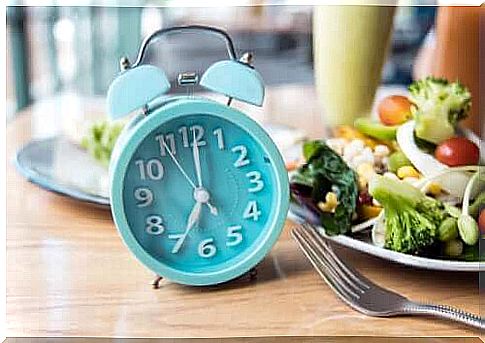What Is The Best Time Of The Day To Eat?

In general, we are more concerned with how much and what we eat than what is the best time to eat. However, it has been shown that the timing of meals also plays a key role in maintaining optimal health. Namely, science has found that determining the best meal time can facilitate the treatment of type 2 diabetes, heart disease, and obesity.
Adherence to a particular eating program is part of a healthy lifestyle. Every cell in the body has a biological timer system that controls the schedules of sleep, hormone release, heart function and even eating.
They are also synchronized with certain environmental signals that indicate, for example, the best time of day to digest food. As you can see, the body is biologically ready for it. Thus, eating at the wrong time can impair not only digestion but also a person’s overall health.
Best time to eat breakfast
Breakfast basically means breaking a fast that lasted a night. The expert group claims that the body’s biological timer digests, absorbs and metabolizes food more efficiently in the early morning. They call it the active phase of the digestive system.
For example, insulin, which regulates blood sugar, is higher in the morning. Therefore, eating breakfast will help you get the right amount of blood sugar, the necessary energy load, for the rest of the day.
Eat breakfast from 6 to 10, as this leaves enough time to prepare for the next meal, which is after a few hours. You should eat at least an hour after waking up and breakfast should include protein, whole grains, fresh fruit, and healthy fats.

What is the best time of the day to eat lunch?
Doctors recommend following a regular lunch time. Studies confirm that eating it outside the biological clock for a set period of time promotes weight gain and obesity. Eating after 3pm slows down weight loss, so the best time to eat lunch is 12:30 to 13:30.
In addition, the time between breakfast and lunch should be 4-5 hours. Add a snack rich in protein and carbs if you can’t eat lunch. This way you stay saturated longer.
Metabolism peaks at lunchtime and this improves digestive function. Lunch should be lighter than breakfast and dinner.
Supper
Professionals recommend eating dinner 4-5 hours after lunch. To keep the schedule so tight, eat dinner at least two hours before bedtime to optimize the digestive process. The quality and quantity of food are also important because too much fat and carbohydrates can predispose to weight gain.
Dinner should be eaten no later than 6 to 7:30 p.m., as it allows the body to focus on resting at night and regenerating tissues instead of having to work on digesting a large meal.
In addition, the International Journal of Obesity reminds us that the body’s ability to regulate blood sugar slows down at night. As a result, people working night shifts gain weight faster and are more prone to diabetes.
In addition, a review of the impact of the schedule on obesity found that the best dinner foods are fish, fruit, nuts, and turkey.
These foods are rich in an amino acid called tryptophan, which helps secrete serotonin and melatonin. They are relaxing substances and sleep inducers that convert fatty acids into energy.

Tips to keep in mind when deciding on the best meal time
It is important to emphasize that the reaction to a particular diet varies between people. This means that what is good for some may not be good for others. Therefore, there should be collaboration with nutrition professionals when developing a health-promoting diet and schedule .
In practice, balancing meals on a given schedule is not that easy. So here are a few tips to make sure everything goes smoothly and you choose the best time of day to eat.
Let’s look at the following recommendations:
- Make healthy changes. When you find you’ve done things wrong and want to fix them, change your meal schedule to optimize your needs. Also, Include exercise to see how your body behaves. Also, try what time of day it is best for you to exercise without losing your night’s sleep and to feel energetic.
- Prepare meals in advance so you can eat on time. This will allow you to stay on schedule and avoid unhealthy snacks.
- Enjoy your meals. When you slow down and chew slowly, you digest better.
- Keep healthy snacks around you if you have to work and postpone your main meal.
- Store food in the refrigerator while you are at work, or keep a cooler bag in your car.
- Keep 4-5 hours between meals, even if you have to work at night.
Remember, it’s not just about quantity and quality when it comes to food; the schedule can also have a significant impact on your well-being. Therefore, planning the right meal schedule should be part of your healthy eating habits.









